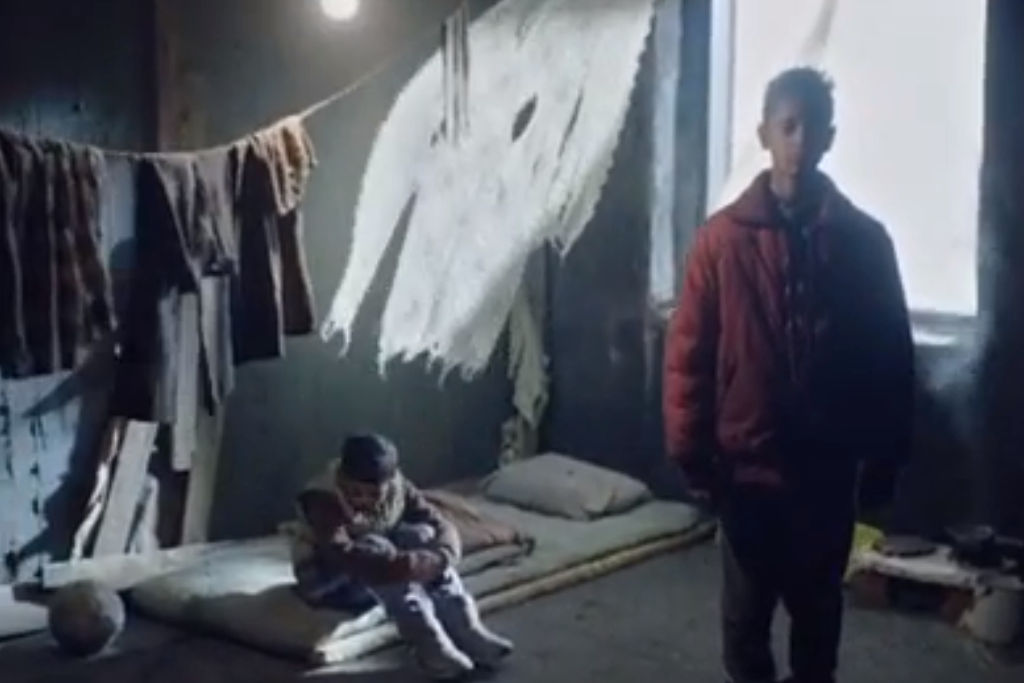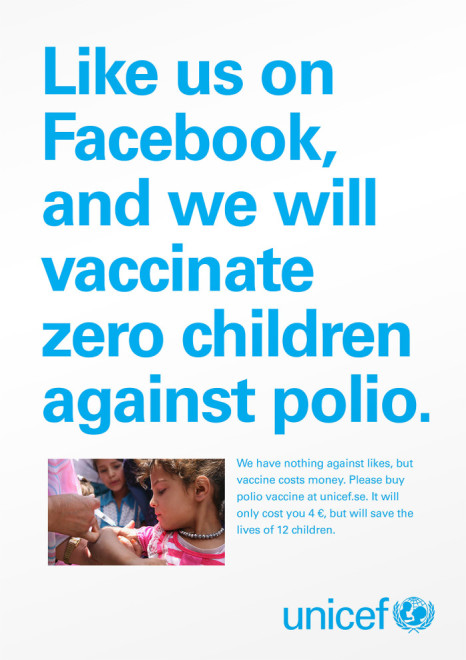What’s In A ‘Like’?
UNICEF Sweden's latest awareness campaign reminds us that Facebook likes don't save lives. Is there any hope in slacktivism?

How many times have you clicked ‘like’ today? I know I’ve slammed that up-thumb more times than I’d care to mention (primarily in support of pugs in clothes and more than one Junkee post). In a day, Facebook’s billion-strong army of users generates around 3.2 billion likes and comments.
That familiar click of a button is the modern nod, the basest recognition of existence. Yet somehow we still give it value, relishing in the embrace of any successful status. Even worse, sometimes we act as if the like is a replacement for genuine, bonafide IRL action.
And so, UNICEF Sweden have released an ad, calling out casual likers and non-contributors in a chillingly up-front video.
There’s also a series of posters, but the one below is probably the best. It puts a definite cost against your Facebook like. And that cost is $0.
The Double-Edged Like
The movement UNICEF are railing against — slacktivism to some, ‘armchair activism’ to others, or the dreaded ‘symbolic action’ — has been around longer than Facebook, but the problem is amplified by its pervasive presence and ease of use. Psychologist Anders Colding nails it: “Just like we need stuff to furnish our homes to show who we are, on Facebook we need cultural objects that put together a version of me that I would like to present to the public.”
But the like can be important. The social collateral of a large following affects not only how an organisation is perceived online, but also how a page is weighted by Facebook’s Edgerank system. We could spend hours deconstructing Facebook’s content algorithms, but basically: the smaller and less engaged a community is, the more unengaged it will become over time. So there is value in a large and engaged community.
Great, right? Let’s like every philanthropic page, every status — share every image or link or video, or anything at all. However, despite their potentially immense power, massive social communities can have serious negative impacts. As pointed out by Evgeny Morozov, many people suffer from “the unrealistic assumption that, given enough awareness, all problems are solvable”, when, in reality, “there are diminishing returns to awareness raising”.
A 2012 study by Deloitte of fundraising not-for-profits reported that 84% of the industry experienced no increase in fundraising despite an increase in high-profile national and international disasters in recent years. Thousands of liked pages and statii, changed profile pictures, twibbons and hashtags aren’t filling any coffers; without money there is no cure, no food, no vaccine — and there are definitely no wells, or public health campaigns.
As UNICEF Sweden say, “even though it’s important to be liked, likes can’t fund medicine, water or food.”
Money Isn’t Everything
Of course, not all activism is about fundraising. Many campaigns focused on social justice — such as the recent, occasionally maligned #DIYrainbow — rely on people’s time as much as their social media to generate traction and deliver their end goal.
The problem comes when these less ‘active’ demonstrations of support are lumped in with impotent button-clicking. An important message is dismissed, simply because stands outside traditional concepts of protest and activism, and relies on visibility and virality to succeed. Yet, #DIYrainbow allowed people who traditionally don’t engage in any kind of activism to voice their support; it extended beyond individuals to communities, and has now planted seeds across the globe. What’s not to like?
We’re all guilty of the pseudo-support that is slacktivism, and in the end, the value of a ‘like’ is infinitely less than any donated dollar or volunteered man-hour. So don’t just like things. Do things, too.
–
Alex Sol Watts is a Wee Waa-born and Sydney-based marketer with just enough time on his hands. You can find him on most of the internet as @solwat

